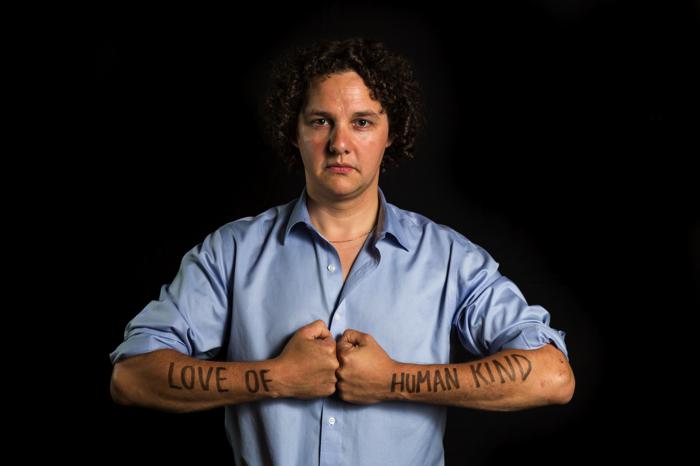Jon Dushinsky’s journey into social change began as a student in the UK, where he was part of a group of student volunteers who would work with charities by taking to the streets to collect canned foods and clothing donations at busy shopping centers. Strange as this activity might sound, he soon found the act of asking 3000 people a day for money and assistance for others, to be a psychologically fulfilling endeavor. The act of attempting to share a cause in a few seconds, in such a way that is engaging enough that it compels and inspires people to give, began to become bigger than even the individual donations themselves—he began to recognize that he had found his calling; that he learned this while still in his teenage years, is inspiring in itself. We sat down with Jon for an inspiring talk about his business and what keeps him motivated.
What is The Conversation Farm?
The Conversation Farm is an agency that creates ideas to help companies, charities and governments build bigger conversations around their brands. Every brand worth its salt today wants a bigger conversation around its brand. It wants ambassadors, people who champion it, talk about it and encourage others to engage with it. This is what The Conversation Farm delivers. We provide a unique blend of social innovation, creative thinking and deep marketing knowledge to create ideas that make brands worth talking about by demonstrating their benevolence in a way that is authentic, inspiring and which people can join.
Who are some of your biggest / smallest customers?
We work with a very broad range of organizations, from multinationals to governments to grass-roots movements. Our client list includes companies in the cosmetic, fashion and sporting industries, national governments as well as groups that are transforming causes as diverse as Alzheimer’s, Motor Neurone Disease & blindness.
Do you prefer public or private sector clientele?
We are about making change, so we prefer to work with organizations that are keen to move the needle in their particular brand environment. The difficult economic climate has put private sector organizations under increasing pressure to innovate and seek out new ways of doing business. Many of our new clients in the last 12 months have been companies with real incentives to embrace creating a following around their brand in order to drive their market share and retain their clients. It is this kind of drive and vision that we seek with all our clients.
Is there a project you have worked on that you are most proud of?
We are working at the moment on a project that we are all very proud of, even though we can’t say much about it yet! A consortium of cosmetic companies approached us last year to help them think through the future of their engagement in the social good space. As you know, companies in this field have been key champions of the Pink movement to fight breast cancer and have made some truly meaningful contributions to women’s health globally. But as the Pink movement has become increasingly fragmented, these companies are rightly asking what the next stage of their engagement in this space should look like. We will soon be delivering a piece of work that will be a true game changer for both women and cosmetic companies and we are very excited about it.
How many countries have you worked or helped to effect change in?
Over 40: from Alaska to Australia and pretty much everywhere in between. In particular, I spent many years working to help people and companies develop the understanding and the tools to be part of creating civil society in Eastern and Central Europe after the fall of the Berlin Wall – a journey that took me to spend large amounts of time in countries like the Ukraine, Georgia, Hungary and many others.
Tell us about your concept of “shared value?”
Shared value in its simplest form is the idea that the more good you do, the more money you will make. The reason for shared value is that in today’s environment, the more good you do, the more you are worth talking about. And the more you are worth talking about, the bigger your following will be. The bigger your following is, the more value you create, therefore the more money you are going to generate. It is the new paradigm of business and it is revolutionizing the way today’s companies are built and run.
Why are the terms “Remarkable and Authentic”, so important in what you do?
People have access to more information today than ever before, and they are increasingly sophisticated in their abilities to collate sources and form their own opinions rather than believing what they are spoon-fed. In the past, you could pretty much get people to believe whatever you wanted as long as you had enough of an advertising budget. Today, if companies, charities or governments say or do things that are deemed to be inauthentic or even simply wrong, people will notice, will talk and there will be a backlash.
We see this all the time – companies like United Airlines, McDonalds or Chevron are amongst those who, in just the last few months, have suffered because they did something inauthentic and were called out on it. If a brand wants to engage people to feel goodwill towards it then it has to create a true alignment between what is says it stands for and the actions it carries out. If it says it believes one thing and then does another then people are going to spot it.
Yet, it is not enough to simply be coherent. A brand can be coherent and dull. If brands want to be worth talking about, if they want to be invited into the personal conversations of individual people, then they have to do something that is both coherent and that makes them stand out, because whilst the public is increasingly good at spotting dissonance, it is also increasingly good at filtering out things that it has seen before or which don’t capture its attention. So authentic and remarkable are two sides of the same coin, and both key parts of creating a successful following.
How important is branding?
Brand is paramount. Today, in a global economy dominated by choice and by the increasing power of the individual, the focus is no longer on what organizations do, but what they are made of. The brand is the expression of what you are made of.
All the most successful brands have guiding principles, which we like to call “belief systems”, that provide them with direction, culture and the ability to make the right decisions about their future. It is the expression of this belief system that is at the core of being able to show what you stand for as an organization, and become attractive to people who don’t yet know you.
How important is it to shift conversations? / What is “the conversation” as you understand it?
Conversations are shifting all the time. They are, by nature, organic and freeform. But we can influence them. Indeed, the power to change the conversation is perhaps the greatest power that any brand can wield today in the marketplace.
To change the conversation you have to help people see an issue in a different way. This is why we focus much of our work at The Conversation Farm on creating ideas that change the way that people look at problems or issues.
We are working at the moment on the issue of childhood obesity in the USA. Our client – a partnership of a children’s hospital and a major food manufacturer – wants to move the needle on this issue. There are hundreds, thousands of initiatives on childhood obesity across the US, some of them from very high profile people like Jamie Oliver or Michele Obama. But none are achieving real, scalable impacts.
To move the needle, our job is not to create yet another initiative. It is to change the conversation around how people look at food and obesity at its most fundamental level. We are focusing on getting people to look at food and how they consume it in a new way, as if the light was being turned on for the first time. Because when you shift a mindset, you have taken the first step to empowering people to change their own behavior patterns. This is the power of the conversation. And this is the power of changing the conversation. Simply put, it makes it possible to do what was previously thought impossible.
Tell us what it means to be voted 2nd most influential communicator in social innovation (and what it means to come second to former President Bill Clinton)?
It was a very humbling moment, in particular because this was a vote of peers rather than of a panel of experts. I have always tried to work on the cutting edge of social innovation, and to be recognized for this work was both exciting and very inspiring. In particular, it has helped spread our message about the power of the conversation, and helped more companies and charities realize what they have to gain by embracing it.
For more information on Jon Duschinsky and The Conversation Farm, you can find him online at: www.theconversationfarm.co, Twitter @jonduschinsky or via email: jon@theconversationfarm.co.
The London Speaker Bureau represents some of the world’s leading business and motivational speakers. If you are interested in booking Jon for your event, or are interested in bringing in other speakers to your corporate events and conferences, please contact tatjana@londonspeakerbureau.com or visit our website www.londonspeakerbureau.com










